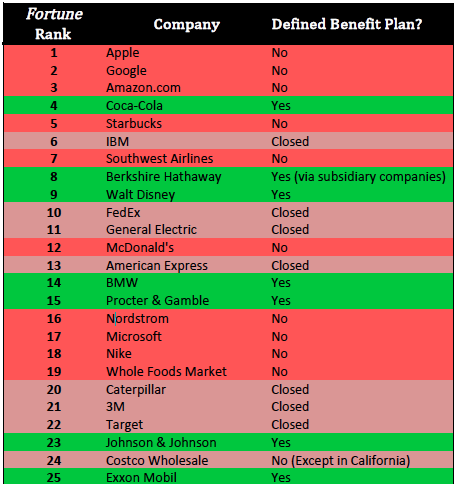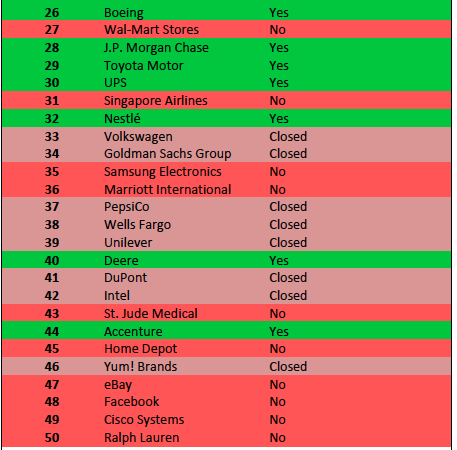(March 7, 2013) – The world’s 50 most admired companies—according to Fortune magazine—bring plenty of employee perks to the table: Free food (Google), sunny locales (Apple, Walt Disney), fat paychecks (Goldman Sachs), steep clothing discounts (Nordstrom).
But what about the traditional gold standard in employee benefits: retirement income for life?
Operating an open defined benefit (DB) pension plan does not, statistically speaking, appear to either help or hurt a company’s chances of ranking among the ‘Most Admired.’ Fourteen of the companies listed (28%) offer the benefit to new US employees. Of the 100 largest companies in the United States, nearly the same proportion (30%) had open DB schemes as of 2012, according to Towers Watson data.
Both of those figures may well be lower for Fortune‘s 2014 list. Some of the list’s plan sponsors have been actively attempting to close their schemes to new members or shift towards defined contribution schemes, including BMW, Boeing, and Coca-Cola.
As plan sponsors dwindle, however, a core group has come to see defined retirement benefits as defining features of their corporations—not deadweight.
Mike Archer, a senior consultant and actuary at Towers Watson, told aiCIO not to expect a DB-free ‘Most Admired’ list anytime soon: “I don’t think the symbolism of a DB plan is dead. I’ve spoken to a number of large corporations with DB plans lately, and those employers point to their plans as a differentiator. That is not to say that companies’ stances might not change in the future. But, they see their ability to continue providing that benefit as something that sets them apart, and allows them to attract and retain top talent.”
That said, Archer felt that for the companies on Fortune’s list, pension status probably had an “indirect impact, at best,” on getting them there. “To be on that list, they have to do a good job of attracting, retaining and engaging employees. But if you look at a list of companies that employees most want to work for, I think there’s a more direct connection with DB plans.”
Indeed, a 2012 survey by Archer’s firm found that nearly three quarters (72%) of employees cited their retirement plans as strong incentives to stay with their employers. Even among younger workers (those under 40) at DB-sponsoring firms, 63% said that the retirement plan was an important factor in accepting their job.
“Another thing to keep in mind about the list,” Archer pointed out, “is that it’s based on a survey of businesses: They may not even know if these companies have DB plans or not.”
Fortune‘s survey partner asked 3,800 respondents from major US and international companies select the top 10 large companies they admired most from a list of last year’s winners and industry leaders. The table below is based on information from the Pension Benefit Guaranty Corporation, filings with the US Securities and Exchange Commission, Towers Watson research, and from the firms themselves.
In the table, ‘Closed’ refers to companies with DB plans that are not open to new employees in the US as of the most recent available information. Some have been officially shuttered, and others, such as Goldman Sachs’, are frozen. —Leanna Orr


